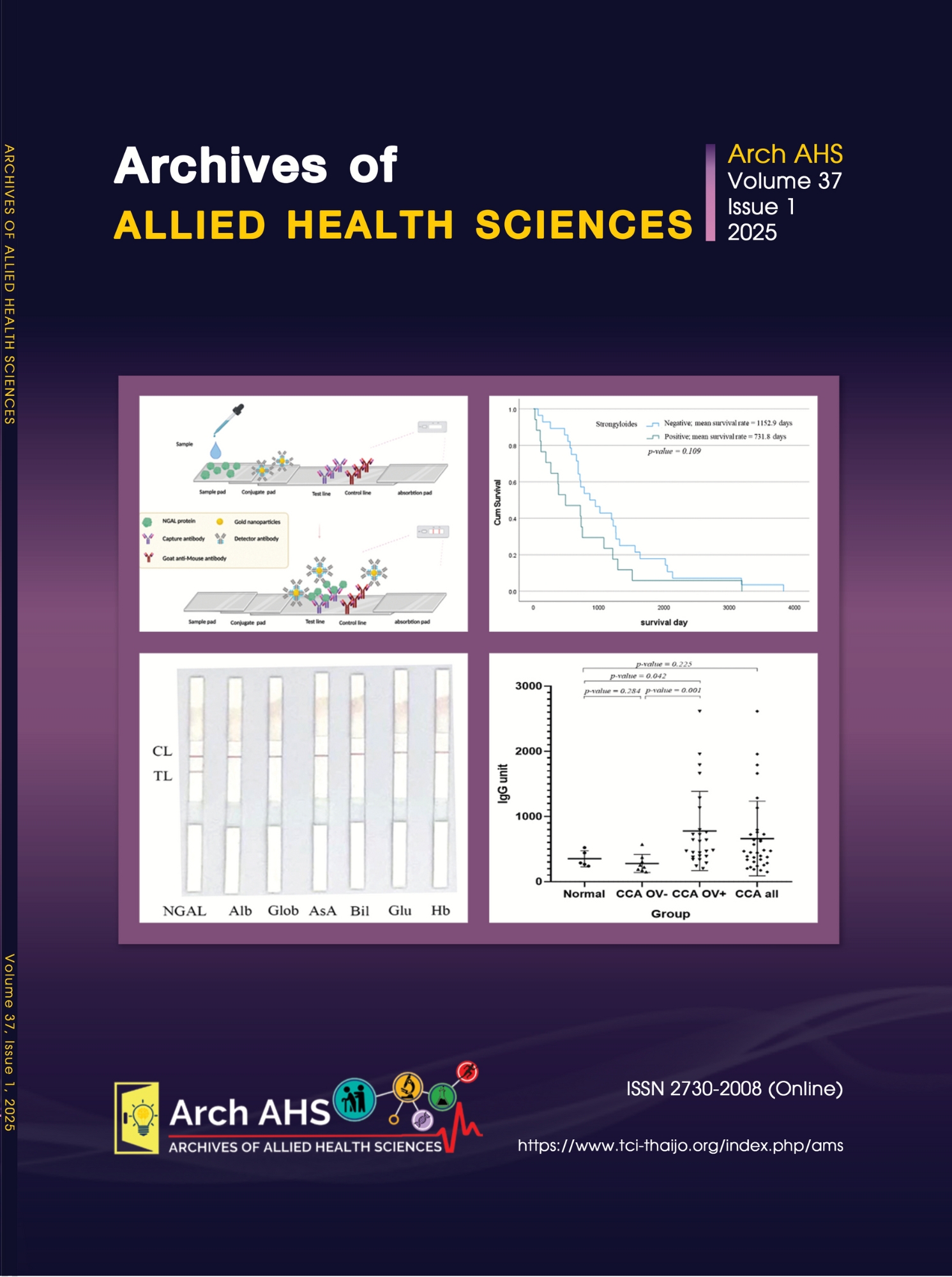Determination of serum IgG level for Strongyloides stercoralis in cholangiocarcinoma
Main Article Content
Abstract
Strongyloides stercoralis is a helminth parasite that is predominantly endemic to the northeastern region of Thailand. Infection in people typically does not result in any noticeable symptoms. However, immunocompromised or immunodeficient patients, such as those with cancer, AIDS, or undergoing chemotherapy, are at risk of developing severe and potentially life-threatening forms of this parasite infection. Indirect enzyme-linked immunosorbent assay (ELISA) employing IgG antibodies in serum are highly sensitive for diagnosing S. stercoralis infection. The objective of this study was to assess the serum IgG levels of S. stercoralis in cholangiocarcinoma (CCA) patients and to analyze the correlation between IgG levels and clinical pathology, chemotherapy treatment status, and laboratory findings. The study found that among the 107 individuals with CCA, 34 (31.78%) tested positive for S. stercoralis, while 73 (68.22%) tested negative based on their serum IgG levels. Nevertheless, no statistically significant correlation was found between any of the analyzed factors, including the status of receiving chemotherapy treatment. This study indicated no significant impact of IgG antibody levels of S. stercoralis on the survival time of CCA patients. Additionally, no link was observed between IgG antibody levels and the severity of CCA in patients. It implies that there is no requirement for further testing on the past presence of S. stercoralis infection before starting chemotherapy in CCA patients. Nevertheless, this study focuses on measuring the concentration of antibodies rather than antigens. Further investigation of the antigen levels is necessary to validate the entirety of the data.
Article Details

This work is licensed under a Creative Commons Attribution-NonCommercial-NoDerivatives 4.0 International License.
References
Kassalik M, Mönkemüller K. Strongyloides stercoralis hyperinfection syndrome and disseminated disease. Gastroenterol Hepatol (N Y) 2011; 7(11): 766-8.
Becker SL, Piraisoody N, Kramme S, Marti H, Silué KD, Panning M, et al. Real-time PCR for detection of Strongyloides stercoralis in human stool samples from Côte d’Ivoire: diagnostic accuracy, inter-laboratory comparison and patterns of hookworm co-infection. Acta Trop 2015; 150: 210-7.
Jongsuksuntigul P, Intapan PM, Wongsaroj T, Nilpan S, Singthong S, Veerakul S, et al. Prevalence of Strongyloides stercoralis infection in northeastern Thailand (agar plate culture detection). J Med Assoc Thai 2003; 86(8): 737-41.
Nontasut P, Muennoo C, Sa-nguankiat S, Fongsri S, Vichit A. Prevalence of strongyloides in Northern Thailand and treatment with ivermectin vs albendazole. Southeast Asian J Trop Med Public Health 2005; 36(2): 442-4.
Beknazarova M, Whiley H, Ross K. Strongyloidiasis: A Disease of Socioeconomic Disadvantage. Int J Environ Res Public Health 2016; 13(5).
Prasongdee TK, Laoraksawong P, Kanarkard W, Kraiklang R, Sathapornworachai K, Naonongwai S, et al. An eleven-year retrospective hospitalbased study of epidemiological data regarding human strongyloidiasis in northeast Thailand. BMC Infect Dis 2017; 17(1): 627.
Rodrigues RM, de Oliveira MC, Sopelete MC, Silva DA, Campos DM, Taketomi EA, et al. IgG1, IgG4, and IgE antibody responses in human strongyloidiasis by ELISA using Strongyloides ratti saline extract as heterologous antigen. Parasitol Res 2007; 101(5): 1209-14.
Eamudomkarn C, Sithithaworn P, Sithithaworn J, Kaewkes S, Sripa B, Itoh M. Comparative evaluation of Strongyloides ratti and S. stercoralis larval antigen for diagnosis of strongyloidiasis in an endemic area of opisthorchiasis. Parasitol Res 2015; 114(7): 2543-51.
Grove DI, Blair AJ. Diagnosis of human strongyloidiasis by immunofluorescence, using Strongyloides ratti and S. stercoralis larvae. Am J Trop Med Hyg 1981; 30(2): 344-9.
Genta RM, Weil GJ. Antibodies to Strongyloides stercoralis larval surface antigens in chronic strongyloidiasis. Lab Invest 1982; 47(1): 87-90.
Sava M, Huynh T, Frugoli A, Kong L, Salehpour M, Barrows B. Colorectal Cancer Related to Chronic Strongyloides stercoralis Infection. Case Rep Gastrointest Med 2020; 2020: 8886460.
Mishra S, Patnayak R, Panda SS, Jena A. Strongyloides stercoralis hyperinfection in a patient with acute lymphoblastic leukemia. J Postgrad Med 2021; 67(2): 113-4.
Plentz RR, Malek NP. Clinical presentation, risk factors and staging systems of cholangiocarcinoma. Best Pract Res Clin Gastroenterol 2015; 29(2): 245-52.
Parkin DM, Ohshima H, Srivatanakul P, Vatanasapt V. Cholangiocarcinoma: epidemiology, mechanisms of carcinogenesis and prevention. Cancer Epidemiol Biomarkers Prev 1993; 2(6): 537-44.
Treeprasertsuk S, Poovorawan K, Soonthornworasiri N, Chaiteerakij R, Thanapirom K, Mairiang P, et al. A significant cancer burden and high mortality of intrahepatic cholangiocarcinoma in Thailand: a nationwide database study. BMC Gastroenterol 2017; 17(1): 3.
Altaee MY, Johnson PJ, Farrant JM, Williams R. Etiologic and clinical characteristics of peripheral and hilar cholangiocarcinoma. Cancer 1991; 68(9): 2051-5.
Kamsa-ard S, Kamsa-ard S, Luvira V, Suwanrungruang K, Vatanasapt P, Wiangnon S. Risk Factors for Cholangiocarcinoma in Thailand: A Systematic Review and MetaAnalysis. Asian Pac J Cancer Prev 2018; 19(3): 605-14.
Machado ER, Teixeira EM, Gonçalves-Pires Mdo R, Loureiro ZM, Araújo RA, Costa-Cruz JM. Parasitological and immunological diagnosis of Strongyloides stercoralis in patients with gastrointestinal cancer. Scand J Infect Dis 2008; 40(2): 154-8.
Zueter AM, Mohamed Z, Abdullah AD, Mohamad N, Arifin N, Othman N, et al. Detection of Strongyloides stercoralis infection among cancer patients in a major hospital in Kelantan, Malaysia. Singapore Med J 2014; 55(7): 367-71.


